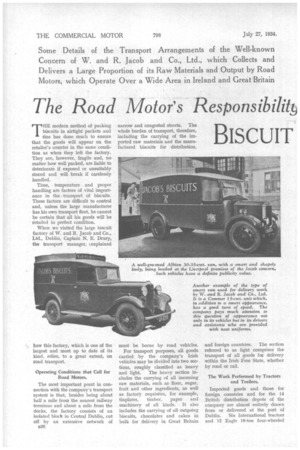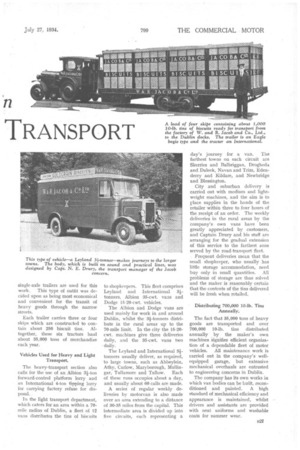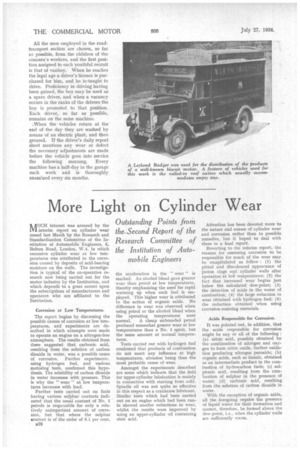The Road Motor's Responsibilitb
Page 44

Page 45

Page 46

If you've noticed an error in this article please click here to report it so we can fix it.
BISCUIT TRANSPORT
THE modern method of packing biscuits in airtight packets and tins has done much to ensure that the goods will appear on the retailer's counter in the same condition as when they left the factory. They are, however, fragile and, no matter how well packed, are liable to deteriorate if exposed or unsuitably stored and will break if carelessly handled.
Time, temperature and proper handling are factors of vital importance in the . transport of biscuits. These factors are difficult to control and, unless the large manufacturer has his own transport fleet, he cannot be certain that all his goods will be retailed in perfect condition.
When we visited the large biscuit factory of W. and R. Jacob and Co., Ltd., Dublin, Captain N. E. Drury, the transport manager, ;explained how this factory, which is one of the largest and most up to date of its kind, relies, to a great extent, on road transport.
Operating Conditions that Call for Road Motors.
The most important point in connection with the Company's transport systerd is that, besides being about half a mile from the nearest railway terminus and about a mile from the docks, the factory consists of an isolated block in Central Dublin, cut off by an extensive network of B20 must be borne by road vehicles.
For transport purposes, all goods carried by the company's Irish vehicles may be divided into two sections, roughly classified as heavy and light. The heavy section in.cludes the carrying of all incoming raw materials, such as flour, sugar, fruit and other ingredients, as well as factory requisites, for example, tinplates, timber, paper and machinery of all kinds. It also includes the carrying of all outgoing biscuits, chocolates and cakes in bulk for delivery in Great Britain and foreign countries. The section referred to as light comprises the transport of all goods for delivery within the Irish Free State, whether by road or rail.
The Work Performed by Tractors and Trailers.
Imported goods and those for foreign countries and for the 14 British distribution depots of the company are almost entirely drawn from or delivered at the port of Dublin. Six International tractors and 12 Eagle 10-ton four-Wheeled single-axle trailers are used for this work. This type of outfit was decided upon as being most economical and convenient for the transit of heavy goods through the narrow Streets.
Each trailer carries three or four skips which are constructed to confain about 250 biscuit tins. Altogether, these six tractors haul about 35,000 tons of merchandize each year.
Vehicles Used for Heavy and Light Transport.
The heavy-transport section also calls for the use of an Albion 3i-ton forward-control platform lorry and an International 4-ton tipping lorry for carrying factory refuse for disposal..
In the light transport department, which caters for an area within a 70mile radius of Dublin, a fleet of 12 vans distributes the tins of biscuits to shopkeepers. This fleet comprises Leyland and International 3itonners, Albion 35-cwt. vans and Dodge 15-20-cwt. vehicles, The Albion and Dodge vans are used mainly for work in and around Dublin, whilst the • 3-i-tonners distribute in the rural areas up to the 70-mile limit. In the city the 15-20cwt. machines give three deliveries daily, and the 35-cwt. vans two daily.
The Leyland and International 3.itanners usually deliver, as required, to large towns, such as Abbeyleix, Athy, Carlow, Maryborough, Mullingar, Tullamore and Tullow. Each of these runs occupies about a day, and usually about 60 calls are made.
A series of regular weekly deliveries by motorvan is also made over an area extending to a distance of 30-35 miles from the capital. This intermediate area is divided up into five circuits, each representing a day's journey for a van. The farthest towns on each circuit are Skerries and Balbriggan, Drogheda and Duleek, Navan and Trim, Edenderry and Kildare, and Newbridge and Blessington.
City and suburban delivery is carried out with medium and lightweight machines, and the aim is to place supplies in the hands of the retailer within three to four hours of the receipt of an order. The weekly deliveries in the rural areas by the company's. own vans have been greatly appreciated by customers, and Captain Drury and his staff are arranging for the gradual extension of this service to the farthest zone served by the road-transport fleet.
• Frequent deliveries mean that the small shopkeeper, who usually, has little storage accommodation, need buy only in small quantities. All problems of storage are thus solved and the maker is reasonably certain that the contents of the tins delivered will be fresh when retailed.
Distributing 700,000 10-lb. Tins Annually.
The fact that 35,000 tons of heavy goods are transported and over 700,000 I0-lb. tins distributed annually by the maker's own machines Signifies efficient organization of a dependable fleet of motor vehicles. All maintenance work is carried out in the company's wellequipped garage, but extensive mechanical overhauls are entrusted to engineering concerns in Dublin.
The company has its own works in which van bodies can be built, reconditioned and painted. A high standard of mechanical efficiency and appearance is maintained, whilst drivers and assistants are provided with neat uniforms and washable coats for summer wear. All the Men employed in the roadtransport section are chosen, so far as possible, from the children of the concern's workers, and the first position assigned to each youthful recruit is that of vanboy. When he reaches the legal age a driver's licence is purchased for him, and he isetaught to drive. Proficiency in driving having been gained, the boy may be used as a spare driver, and when a vacancy occurs in the ranks of the drivers the boy is promoted to that position. Each driver, so far as possible, remains on the same machine.
When the vehicles return at the end of the day they are washed by means of an electric plant, and then greased. If the driver's daily report sheet mentions any wear or defect the necessary adjustments are made before the vehicle goes -into service the following morning. Every machine has a half-day in the garage each week and is thoroughly exam.;.ned every six months.




































































































